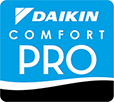Allergy sufferers know how challenging it can be to find relief, especially when allergens are present indoors. Dust, pollen, pet dander, and other airborne particles can aggravate allergies, leading to discomfort and health issues. Ensuring excellent indoor air quality is crucial for creating a more comfortable living environment.
One effective way to improve indoor air quality is through the use of air filtration systems. These systems are designed to remove contaminants from the air, making it cleaner and healthier to breathe. Our professionals are well-versed in the various types of air filtration systems available, and we understand how they can benefit those struggling with allergies.
Air filtration systems work by capturing and removing pollutants that would otherwise circulate through your home. By understanding the types of allergens that can affect you and your family, you can better appreciate the value of a quality air filtration system. These systems can provide significant relief by reducing the presence of harmful particles in the air.
Understanding Indoor Air Quality and Allergens
Indoor air quality can significantly impact health, especially for allergy sufferers. Common allergens like dust, pollen, pet dander, and mold spores often find their way indoors, where they can linger and become more concentrated. Poor indoor air quality can lead to a variety of health issues, including respiratory problems and aggravated allergy symptoms.
Our professionals understand the importance of identifying the sources of indoor allergens. By knowing what pollutants are present, we can develop targeted strategies to reduce them. For example, dust mites thrive in carpets, bedding, and upholstered furniture. Identifying these sources allows us to recommend specific cleaning routines and air filtration systems that can capture and reduce these particles.
The impact of indoor allergens can be profound. Pet dander, for example, is a common allergen that can cause sneezing, itching, and other allergic reactions. Even if you don’t have pets, dander can still be present, brought in by visitors or through the air. Pollen, another widespread allergen, can enter your home through open windows and doors. Understanding these factors is crucial for improving indoor air quality and providing relief for allergy sufferers.
How Air Filtration Systems Work
Air filtration systems are designed to improve indoor air quality by removing contaminants from the air. These systems use various methods to capture and eliminate harmful particles. Understanding how these systems work can help you make an informed decision about which type is best for your needs.
- Mechanical Filters: These filters work by trapping particles as air passes through them. High-efficiency particulate air (HEPA) filters are particularly effective, capturing a wide range of allergens and other contaminants. Our technicians can explain the different grades of filters and recommend the most suitable options for your home.
- Electronic Purification: These systems use electrostatic charges to attract and capture particles. Air purifiers with ionizers fall under this category. They release charged ions that attach to pollutants, causing them to drop out of the air or be captured by a collection plate. This method can be very effective for removing smaller particles that mechanical filters might miss.
- Ultraviolet (UV) Germicidal Lights: These lights target and neutralize bacteria, viruses, and mold spores, preventing them from circulating in your home. Our professionals are trained to install and maintain these systems, ensuring your air quality is as high as possible. By understanding the mechanisms behind air filtration systems, you can better appreciate how they can improve your indoor environment.
Types of Air Filtration Systems
There are several types of air filtration systems available, each offering unique benefits. Selecting the right one can make a significant difference in improving indoor air quality and addressing specific allergy concerns.
- HEPA Filters: They can capture a wide range of particles, including dust, pollen, and pet dander. HEPA filters are commonly used in residential settings and can be integrated into HVAC systems or used as standalone air purifiers. Our technicians can help install and maintain these systems to ensure they operate efficiently.
- Activated Carbon Filters: These filters are especially effective at removing odors and chemicals from the air. They work by trapping gases and volatile organic compounds (VOCs) on a bed of activated carbon. While they may not capture particles as small as those trapped by HEPA filters, they excel in improving air quality by tackling gases and odors.
- Ultraviolet Germicidal Irradiation (UVGI): These systems use UV light to neutralize bacteria, viruses, and mold spores. These systems are often used in healthcare settings but can also be beneficial in homes. By targeting biological contaminants, UVGI systems add an extra layer of protection to your air purification efforts. Our professionals can provide guidance on integrating UVGI systems with other filtration methods to maximize effectiveness.
Benefits of Air Filtration Systems for Allergy Sufferers
Air filtration systems offer significant benefits for individuals suffering from allergies. One of the most notable advantages is the removal of common allergens from the indoor environment. By capturing dust, pollen, and pet dander, these systems help to create a cleaner and healthier space. This can lead to fewer allergic reactions and improved overall well-being.
Cleaner air can make a noticeable difference in day-to-day comfort. Allergy sufferers often experience symptoms like sneezing, watery eyes, and congestion. Reducing allergens in the air can alleviate these symptoms, allowing for better focus and productivity. Our professionals understand the importance of creating a comfortable environment and can recommend the best systems for your needs.
In addition to improving air quality, air filtration systems can also help to reduce the spread of airborne illnesses. By removing bacteria and viruses from the air, these systems add an extra layer of protection, making your home a safer place. Improved air quality can lead to better sleep and reduced respiratory issues, contributing to a higher quality of life.
Conclusion
Air filtration systems are essential for anyone looking to improve indoor air quality and find relief from allergies. Understanding the different types of systems available helps you select the best option to suit your specific needs. From HEPA and activated carbon filters to UVGI systems, each plays a vital role in creating a cleaner and healthier living environment.
By investing in a quality air filtration system, you not only reduce allergens but also enhance the overall comfort and safety of your home. Our professionals are well-versed in the installation and maintenance of these systems, ensuring they perform at their best to provide you with clean, fresh air.
For expert HVAC services in Charleston, including the selection and maintenance of your air filtration system, contact Holy City Heating & Air, LLC. We are dedicated to improving your indoor air quality and helping you find relief from allergies. Call us today to take the first step toward a healthier home!






